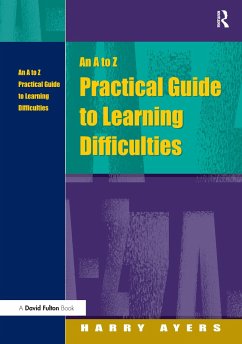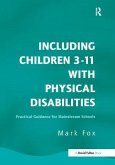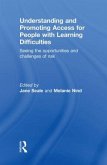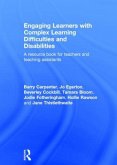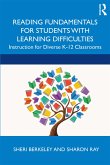- Gebundenes Buch
- Merkliste
- Auf die Merkliste
- Bewerten Bewerten
- Teilen
- Produkt teilen
- Produkterinnerung
- Produkterinnerung
Accessing up-to-date information about general and specific learning difficulties is made easy, with this indispensable reference book.
Andere Kunden interessierten sich auch für
![Self-Formation: Or, the History of an Individual Mind; Intended As a Guide for the Intellect Through Difficulties to Success Self-Formation: Or, the History of an Individual Mind; Intended As a Guide for the Intellect Through Difficulties to Success]() Capel LofftSelf-Formation: Or, the History of an Individual Mind; Intended As a Guide for the Intellect Through Difficulties to Success35,99 €
Capel LofftSelf-Formation: Or, the History of an Individual Mind; Intended As a Guide for the Intellect Through Difficulties to Success35,99 €![Including Children 3-11 With Physical Disabilities Including Children 3-11 With Physical Disabilities]() Mark FoxIncluding Children 3-11 With Physical Disabilities133,99 €
Mark FoxIncluding Children 3-11 With Physical Disabilities133,99 €![Speech and Language Difficulties in the Classroom Speech and Language Difficulties in the Classroom]() Deirdre MartinSpeech and Language Difficulties in the Classroom153,99 €
Deirdre MartinSpeech and Language Difficulties in the Classroom153,99 €![The Routledge International Handbook of Dyscalculia and Mathematical Learning Difficulties The Routledge International Handbook of Dyscalculia and Mathematical Learning Difficulties]() The Routledge International Handbook of Dyscalculia and Mathematical Learning Difficulties289,99 €
The Routledge International Handbook of Dyscalculia and Mathematical Learning Difficulties289,99 €![Understanding and Promoting Access for People with Learning Difficulties Understanding and Promoting Access for People with Learning Difficulties]() Understanding and Promoting Access for People with Learning Difficulties189,99 €
Understanding and Promoting Access for People with Learning Difficulties189,99 €![Engaging Learners with Complex Learning Difficulties and Disabilities Engaging Learners with Complex Learning Difficulties and Disabilities]() Barry CarpenterEngaging Learners with Complex Learning Difficulties and Disabilities172,99 €
Barry CarpenterEngaging Learners with Complex Learning Difficulties and Disabilities172,99 €![Reading Fundamentals for Students with Learning Difficulties Reading Fundamentals for Students with Learning Difficulties]() Sheri BerkeleyReading Fundamentals for Students with Learning Difficulties179,99 €
Sheri BerkeleyReading Fundamentals for Students with Learning Difficulties179,99 €-
-
-
Accessing up-to-date information about general and specific learning difficulties is made easy, with this indispensable reference book.
Produktdetails
- Produktdetails
- Verlag: David Fulton Publishers
- Seitenzahl: 114
- Erscheinungstermin: 2. Dezember 2016
- Englisch
- Abmessung: 260mm x 183mm x 11mm
- Gewicht: 425g
- ISBN-13: 9781138156029
- ISBN-10: 1138156027
- Artikelnr.: 69993115
- Herstellerkennzeichnung
- Libri GmbH
- Europaallee 1
- 36244 Bad Hersfeld
- gpsr@libri.de
- Verlag: David Fulton Publishers
- Seitenzahl: 114
- Erscheinungstermin: 2. Dezember 2016
- Englisch
- Abmessung: 260mm x 183mm x 11mm
- Gewicht: 425g
- ISBN-13: 9781138156029
- ISBN-10: 1138156027
- Artikelnr.: 69993115
- Herstellerkennzeichnung
- Libri GmbH
- Europaallee 1
- 36244 Bad Hersfeld
- gpsr@libri.de
Harry Ayers
Dedication
Title
Copyright
Preface
A
ABC
Absence
Absences (petit mal)
Academic skills disorders
Achievement
ADD/ADHD
Adolescents with learning difficulties
Affective factors
Agraphia
Alexia
Anxiety
Aphasia
Apraxia
Asperger, or Asperger's, syndrome
Assessment
Attentional difficulties
Attitudes
Attribution
Attribution retraining
Attribution theory
Attributional style
Auditory processing
Autism
Autistic spectrum disorders
Avoidance behaviour
B
Behaviour analysis
Behaviour management
Behavioural and emotional difficulties
Behavioural teaching methods
Behavioural theories of learning
Benchmarks and benchmarking
Birth problems
Brain damage
Brain-injured children
Broca's aphasia
C
Calculator use
Children with learning difficulties
Children at risk
Children with Specific Learning Difficulties (SpLD)
Chromosomal abnormalities
Class size
Classroom environment
Clinical teaching
Cloze procedure
Code of Practice (COP) (Revised 2001)
Cognitive abilities
Cognitive strategies
Cognitive-behavioural theories of learning
Collaborative learning
Communication skills
Comprehension
Computational skills
Computer-assisted learning
Confidence
Constructivist theory of learning
Contextual cues
Co-teaching
Counting skills
Criterion-referenced tests
Curriculum
Curriculum-based assessment
D
Deaf pupils
Decoding
Deficit model
Depression
Developmental delay
Developmental psychology
Diagnostic assessment
Diagnostic tests
Diagnostic-prescriptive teaching
Differentiation
Difficulty level
Direct instruction
Directed reading activity
Discrepancy formulae
Down's syndrome or Down syndrome
Dynamic assessment
Dyscalculia
Dysgraphia
Dyslexia
Dyspraxia or developmental dyspraxia
E
Early intervention
Early intervention strategies
Early signs
Emergent literacy
Emotional and behavioural factors
Epilepsy
Error analysis
Expectancy-value theory
Explanatory style
Explicit teaching
Expressive language disorder
Extrins
Title
Copyright
Preface
A
ABC
Absence
Absences (petit mal)
Academic skills disorders
Achievement
ADD/ADHD
Adolescents with learning difficulties
Affective factors
Agraphia
Alexia
Anxiety
Aphasia
Apraxia
Asperger, or Asperger's, syndrome
Assessment
Attentional difficulties
Attitudes
Attribution
Attribution retraining
Attribution theory
Attributional style
Auditory processing
Autism
Autistic spectrum disorders
Avoidance behaviour
B
Behaviour analysis
Behaviour management
Behavioural and emotional difficulties
Behavioural teaching methods
Behavioural theories of learning
Benchmarks and benchmarking
Birth problems
Brain damage
Brain-injured children
Broca's aphasia
C
Calculator use
Children with learning difficulties
Children at risk
Children with Specific Learning Difficulties (SpLD)
Chromosomal abnormalities
Class size
Classroom environment
Clinical teaching
Cloze procedure
Code of Practice (COP) (Revised 2001)
Cognitive abilities
Cognitive strategies
Cognitive-behavioural theories of learning
Collaborative learning
Communication skills
Comprehension
Computational skills
Computer-assisted learning
Confidence
Constructivist theory of learning
Contextual cues
Co-teaching
Counting skills
Criterion-referenced tests
Curriculum
Curriculum-based assessment
D
Deaf pupils
Decoding
Deficit model
Depression
Developmental delay
Developmental psychology
Diagnostic assessment
Diagnostic tests
Diagnostic-prescriptive teaching
Differentiation
Difficulty level
Direct instruction
Directed reading activity
Discrepancy formulae
Down's syndrome or Down syndrome
Dynamic assessment
Dyscalculia
Dysgraphia
Dyslexia
Dyspraxia or developmental dyspraxia
E
Early intervention
Early intervention strategies
Early signs
Emergent literacy
Emotional and behavioural factors
Epilepsy
Error analysis
Expectancy-value theory
Explanatory style
Explicit teaching
Expressive language disorder
Extrins
Dedication
Title
Copyright
Preface
A
ABC
Absence
Absences (petit mal)
Academic skills disorders
Achievement
ADD/ADHD
Adolescents with learning difficulties
Affective factors
Agraphia
Alexia
Anxiety
Aphasia
Apraxia
Asperger, or Asperger's, syndrome
Assessment
Attentional difficulties
Attitudes
Attribution
Attribution retraining
Attribution theory
Attributional style
Auditory processing
Autism
Autistic spectrum disorders
Avoidance behaviour
B
Behaviour analysis
Behaviour management
Behavioural and emotional difficulties
Behavioural teaching methods
Behavioural theories of learning
Benchmarks and benchmarking
Birth problems
Brain damage
Brain-injured children
Broca's aphasia
C
Calculator use
Children with learning difficulties
Children at risk
Children with Specific Learning Difficulties (SpLD)
Chromosomal abnormalities
Class size
Classroom environment
Clinical teaching
Cloze procedure
Code of Practice (COP) (Revised 2001)
Cognitive abilities
Cognitive strategies
Cognitive-behavioural theories of learning
Collaborative learning
Communication skills
Comprehension
Computational skills
Computer-assisted learning
Confidence
Constructivist theory of learning
Contextual cues
Co-teaching
Counting skills
Criterion-referenced tests
Curriculum
Curriculum-based assessment
D
Deaf pupils
Decoding
Deficit model
Depression
Developmental delay
Developmental psychology
Diagnostic assessment
Diagnostic tests
Diagnostic-prescriptive teaching
Differentiation
Difficulty level
Direct instruction
Directed reading activity
Discrepancy formulae
Down's syndrome or Down syndrome
Dynamic assessment
Dyscalculia
Dysgraphia
Dyslexia
Dyspraxia or developmental dyspraxia
E
Early intervention
Early intervention strategies
Early signs
Emergent literacy
Emotional and behavioural factors
Epilepsy
Error analysis
Expectancy-value theory
Explanatory style
Explicit teaching
Expressive language disorder
Extrins
Title
Copyright
Preface
A
ABC
Absence
Absences (petit mal)
Academic skills disorders
Achievement
ADD/ADHD
Adolescents with learning difficulties
Affective factors
Agraphia
Alexia
Anxiety
Aphasia
Apraxia
Asperger, or Asperger's, syndrome
Assessment
Attentional difficulties
Attitudes
Attribution
Attribution retraining
Attribution theory
Attributional style
Auditory processing
Autism
Autistic spectrum disorders
Avoidance behaviour
B
Behaviour analysis
Behaviour management
Behavioural and emotional difficulties
Behavioural teaching methods
Behavioural theories of learning
Benchmarks and benchmarking
Birth problems
Brain damage
Brain-injured children
Broca's aphasia
C
Calculator use
Children with learning difficulties
Children at risk
Children with Specific Learning Difficulties (SpLD)
Chromosomal abnormalities
Class size
Classroom environment
Clinical teaching
Cloze procedure
Code of Practice (COP) (Revised 2001)
Cognitive abilities
Cognitive strategies
Cognitive-behavioural theories of learning
Collaborative learning
Communication skills
Comprehension
Computational skills
Computer-assisted learning
Confidence
Constructivist theory of learning
Contextual cues
Co-teaching
Counting skills
Criterion-referenced tests
Curriculum
Curriculum-based assessment
D
Deaf pupils
Decoding
Deficit model
Depression
Developmental delay
Developmental psychology
Diagnostic assessment
Diagnostic tests
Diagnostic-prescriptive teaching
Differentiation
Difficulty level
Direct instruction
Directed reading activity
Discrepancy formulae
Down's syndrome or Down syndrome
Dynamic assessment
Dyscalculia
Dysgraphia
Dyslexia
Dyspraxia or developmental dyspraxia
E
Early intervention
Early intervention strategies
Early signs
Emergent literacy
Emotional and behavioural factors
Epilepsy
Error analysis
Expectancy-value theory
Explanatory style
Explicit teaching
Expressive language disorder
Extrins

